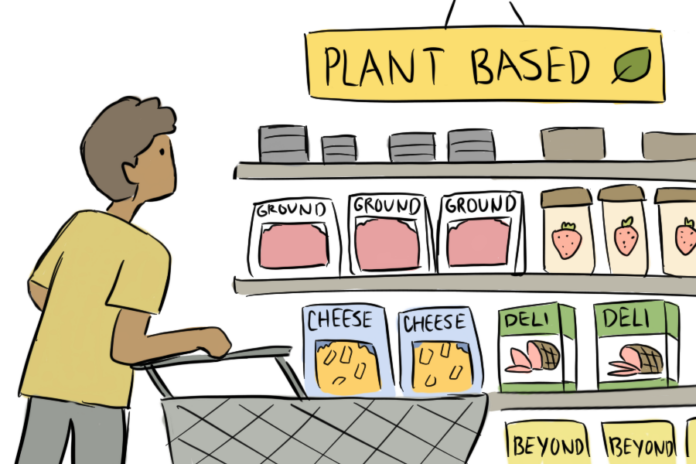How much of a difference is your oat milk really making?
By MOLLY THOMPSON – mmtthompson@ucdavis.edu
20 years ago, you would have never been able to walk out of an ice cream parlor with a scoop of vegan, oat milk “frozen dessert” on your cone. But nowadays, it is almost expected for any given California culinary establishment to offer plant-based options. Alternatives to animal products are more trendy than they have ever been. A lot of that can be attributed to recent research suggesting that products derived from plants are significantly less harmful to the environment than conventional equivalents. While this may very well be true, it isn’t always the case.
In any situation, a blanket statement is not always going to be applicable. A multivitamin won’t cure every deficiency, you shouldn’t always listen to your parents and losing weight isn’t always healthy — one size doesn’t fit all. Our world is just too complicated for anything to have a true panacea. In the case of sustainable eating, there are too many contributing factors to take into consideration for any rules to be universally germane.
We are told that livestock require more land and water to care for than plants and that bovine animals produce high levels of methane and carbon dioxide. Though this is generally true, it doesn’t mean that vegetarian or vegan foods always have less of an environmental impact than animal products.
A large portion of the carbon footprint of groceries comes from emissions during production and transportation. The process of getting a product from farms to fridges involves many steps of processing, packaging and inspection. Each step takes energy and resources that come from fossil fuels and release greenhouse gasses.
Most conventional groceries originate thousands of miles from where they are sold to consumers — transportation accounts for nearly one-fifth of all carbon emissions within the food industry. Ingredients are shipped back and forth for different stages of production, resulting in massive additional environmental costs. This is true of all foods, not just animal products. The only reason we can buy pineapples at Trader Joe’s in February is because they are flown in from China or Thailand.
So naturally, the best solution to this problem is to buy locally sourced foods. That’s why we are always told that we should buy produce “in season” — because it is more likely to be locally grown. While this is good advice in theory, we can’t all get the foods we need from producers within a few zip codes. So, we take what we can get, and we sometimes buy tofu instead of pork to ease our consciences.
As someone who has been through a “vegan for the environment” phase and has come out the other side regularly buying yogurt and ice cream, here is my conclusion: not all groceries are created equal (No duh, Molly, tell me something I don’t know). What I mean by that is an Impossible Burger doesn’t always have less of a carbon footprint than your standard burger patty. If your conventional burger has a turkey patty that comes from a local restaurant or a small, independent farm, it will be a more sustainable choice than a mass-market veggie patty made from soybeans grown on a factory farm in Brazil or Argentina.
If your only options are beef or tofu from Safeway, then yes, tofu is going to be the more environmentally friendly choice. Granted that soybeans take a lot of water to grow, cattle require insurmountably more. (As an aside, beef is, by a longshot, the food with the largest environmental impact. It produces, on average, 10 times the amount of greenhouse gasses per unit than chicken or fish and more than 30 times that of tofu.)
But if you’re choosing between tofu from Safeway and chicken from an independent, local grocery store, then it’s winner-winner chicken for dinner. Cow’s milk requires more water to produce than almond milk, but if you can get Straus milk in a glass bottle that can be returned and reused, then that is going to be better than almond milk from a factory farm in a plastic carton that will end in the landfill. (Another aside: oats are much less resource-intensive than most other alternative milk sources, so you can feel good about yourself when you buy an overpriced oat milk latte — it’s for the planet, I don’t make the rules).
I know we are all just baby adults doing our best to survive out in the vast, predator-filled expanse that is this societal landscape. I don’t expect myself (or anyone else) to be out here buying $17 eggs that were pooped out of a gluten-free chicken in someone’s backyard next door. It’s not about being perfect; it’s about making small choices when we can.
If you are walking down E Street for ice cream, go for Davis Creamery over Baskin Robbins. But if you have a BOGO coupon for Baskin Robbins, see if they have a dairy-free flavor. Just like nothing is always true, nothing is make-or-break. It’s true that our choices impact our world, and it’s important to be aware of that, but what’s bona fide and realistic is not what we are always told.
Written by: Molly Thompson — mmtthompson@ucdavis.edu
Disclaimer: The views and opinions expressed by individual columnists belong to the columnists alone and do not necessarily indicate the views and opinions held by The California Aggie.









